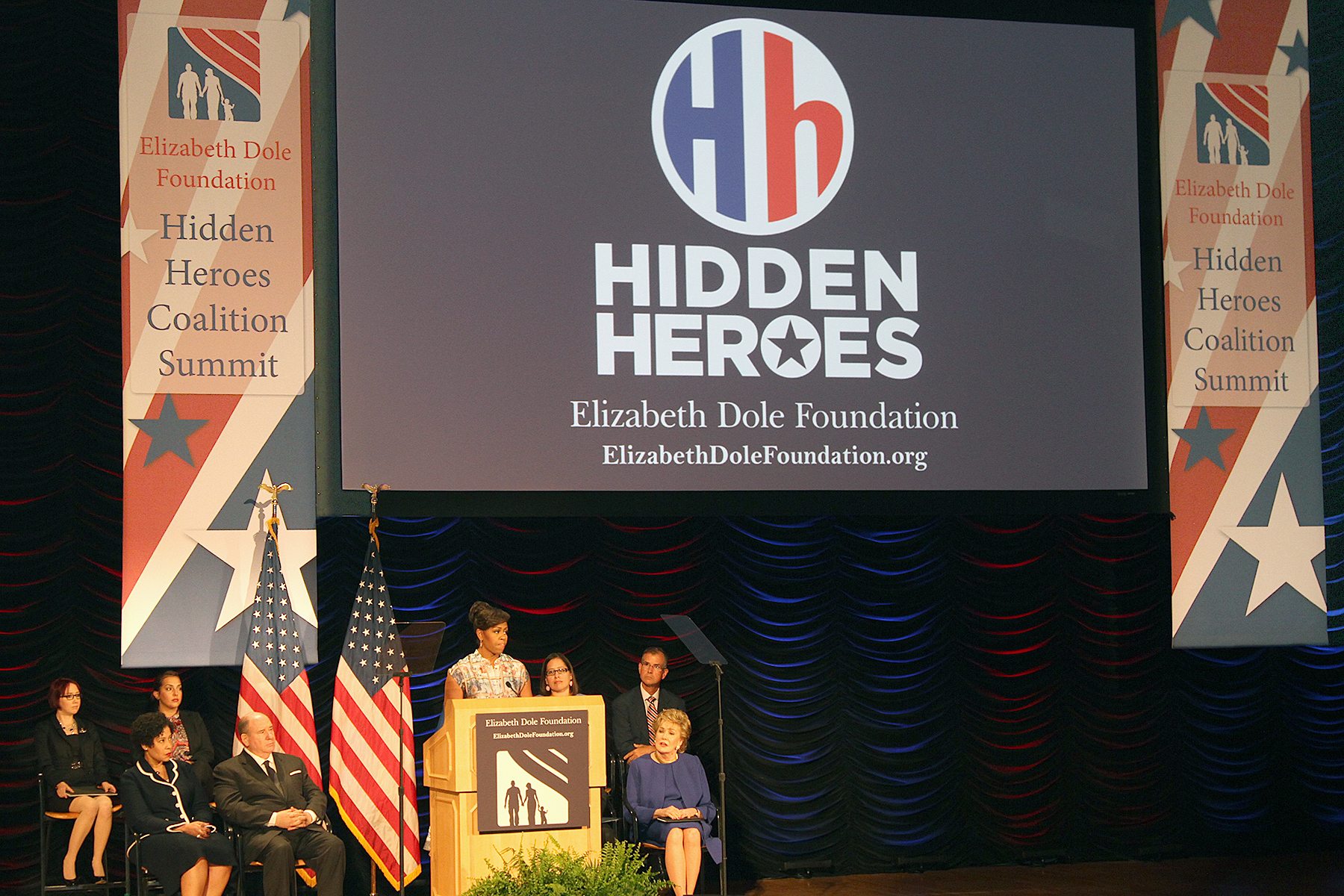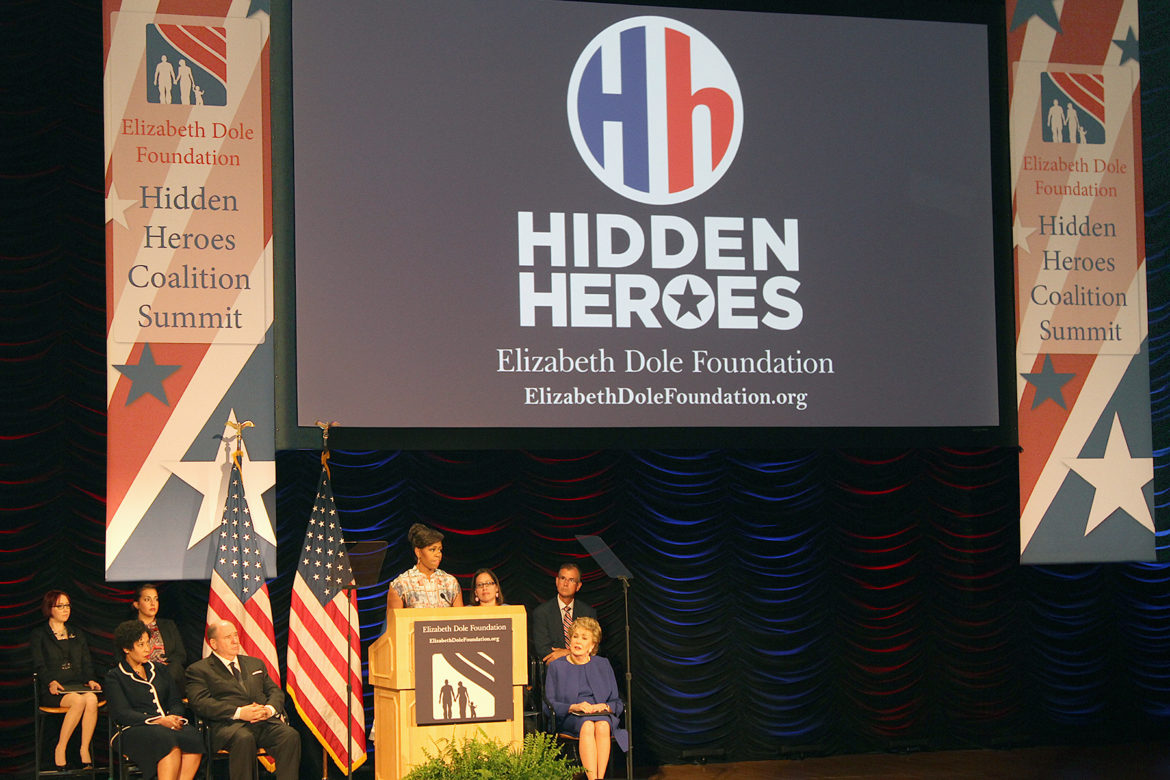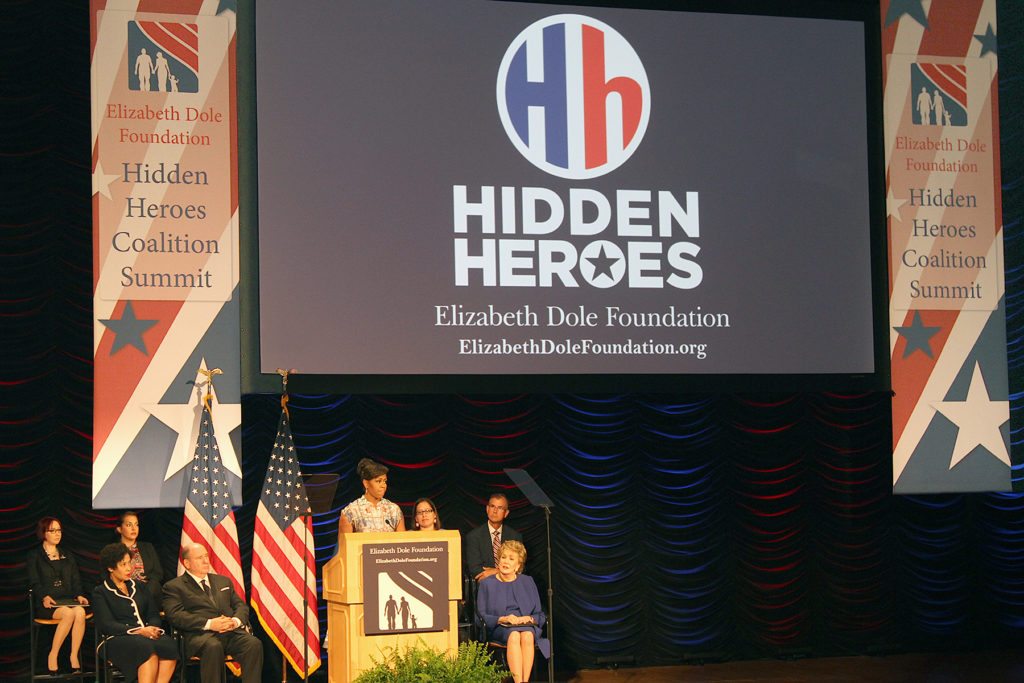First Lady Michelle Obama pledges her support to America’s military and veteran caregivers at the Elizabeth Dole Foundation’s Hidden Heroes Coalition Summit, May 20, Ronald Reagan Building and International Trade Center, Washington, DC. Photo credit: Lynn Dykstra, Focused Images.
The Elizabeth Dole Foundation hosted the 2015 Hidden Heroes Coalition Summit: Progress and Promise on May 20 at the Ronald Reagan Building and International Trade Center, in Washington, DC. The event featured remarks from First Lady Michelle Obama and Veterans Affairs Secretary Robert A. McDonald, along with a special video message from Tom Hanks announcing his leadership of a national awareness campaign to call attention to the service provided by loved ones caring for wounded, ill and injured service members and veterans. The voices were different, but they all touched on a resounding theme: our nation has made real progress on behalf of military and veteran caregivers, but more must be done to provide these hidden heroes with the support they need and deserve.
The summit marked one year since Senator Elizabeth Dole launched the National Coalition for Military Caregivers. At the time of the coalition’s launch, Senator Dole promised to report on the progress made on behalf of caregivers one year later. The program opened with an impressive series of coalitions partners describing the initiatives their organizations had launched or grown in the last 12 months to support military and veteran caregivers. Speakers included leaders from USAA, lead sponsor of the Summit, the U.S. Chamber of Commerce Foundation’s Hiring Our Heroes, Capital One, Easter Seals, The Home Depot Foundation, Operation Homefront, TAPS, and the Bristol-Myers Squibb Foundation.
In her own remarks, Senator Dole named dozens of private, public, nonprofit and faith organizations and leaders who have taken steps to directly address the gaps in support revealed by the Foundation’s 2014 RAND report on military and veteran caregivers. Senator Dole reflected on the significant shift in the nation’s caregiver support, stating, “We have seen allied groups working together; funders teaming with service providers; and ideas, resources, and best practices shared across the board without pride of ownership… The breadth of organizations doing their part is extraordinary, and when you bring them all together you see the powerful and effective relationships that have been formed to make it all possible.”
The most powerful moments of the event came from the caregivers themselves. Nine Dole Caregivers Fellows spoke from the stage, sharing their personal stories of struggle and resilience. More than 60 other fellows attended the event to represent the 5.5 million loved ones caring for America’s wounded warriors. American Airlines and Hilton Hotels, with additional support from Bank of America and Hope for the Warriors made it possible for these fellows to travel from across the nation to participate in this special event.
Acknowledging that the past year is just the start of what our nation must do to better support military and veteran caregivers, Senator Dole announced the Foundation’s Hidden Hero Impact Councils, launched earlier this year with the support of Booz Allen Hamilton. These seven councils, comprised of the leaders of the Foundation’s coalition, are focused on the most critical issues faced by caregivers: Community Support at Home; Education and Training, Employment and Workplace Support; Financial and Legal Planning; Interfaith Action and Ministry; and Respite Care. These councils, designed to bring increased strategic organization to the growing list of resources being established for caregivers, collaborated on a series of actions to take in the year ahead to support of military and veteran caregivers. (See appendix for list of council commitments)
One of the primary commitments made by the Impact Councils was a national awareness campaign to call attention to the contributions of military and veteran caregivers and the ways our nation could better offer them support. In a special recorded message, Tom Hanks pledged his support to military and veteran caregivers by leading this campaign. In his message, Hanks said, “Senator Dole pointed out to me when we met, there are heroes, millions of them, who are every day caring for our wounded veterans. I join her in this defining national effort to make us all aware of these hidden heroes – to acknowledge the work they do. . . and assistance they are going to need.”
In the lead up to the Tom Hanks announcement, Dole Caregiver Fellow Brian Vines, a veteran who also cares for his veteran wife, spoke on the topic of national awareness. He remarked that the lack of American’s attention to the role of caregivers leaves those caregivers feeling isolated, hopeless and depressed. He added, “The public is aware that our veterans experience these issues, but most are unaware of the impact on caregivers. Public awareness of military and veteran caregivers is critical to empowering us to care for our loved ones.”
The Elizabeth Dole Foundation activities continued today with the Hidden Heroes: Focus on Faith, an interfaith and congressional leadership breakfast reception honoring military and veteran caregivers in the Kennedy Caucus Room of the Russell Senate Office Building. The event included Hidden Heroes Congressional Caucus co-chairs, Senators John McCain and Jack Reed, Leader Nancy Pelosi, Congressman Jeff Miller, and special guest Pastor Joel Osteen. The morning served as an example of the united, bipartisan support our military and veteran caregivers deserve, and an acknowledgement of the important role played by Congress and faith communities in ensuring them stronger support.
The Elizabeth Dole Foundation’s Hidden Heroes Impact Councils will pursue the following actions in support of America’s military and veteran caregivers with the support and leadership of the named volunteer co-chairs:
Community Support at Home
Co-Chairs
• Rachel O’Hern, Executive Director, Quality of Life, Inc.
• Heather Prill Pritchard, Sr. Manager of National Partnerships and Atlanta Hometown Giving, The Home Depot Foundation
Commitments
• Launch a national awareness campaign chaired by Tom Hanks to grow America’s understanding of the challenges faced by caregivers and how they can contribute to their solutions
• Produce and disseminate a “Caregiver Credo” developed by active caregivers for their peers to use for explaining the needs, strengths, and responsibilities of America’s caregivers to employers, community organizations, or others unfamiliar with military caregiving
• Support the U.S. Department of Veterans Affairs in direct engagement with caregivers across the country and establish an advisory board to ensure the VA’s leadership hears feedback and ideas directly from those caring for wounded warriors.
Education and Training
Co-Chairs
• Lynda Davis, Executive Vice President, Tragedy Assistance Program for Survivors (TAPS)
• Marjorie Morrison, CEO and Founder, Psych Armor Institute
Commitments
• Develop a comprehensive, one-stop online clearinghouse for existing training resources and materials to help military and veteran caregivers better inform and empower themselves
• Collaborate with experts across the Foundation’s Impact Councils to develop original online training modules across the most critical caregiving issues to educate both caregivers and those who provide caregiver services
• Provide counsel and feedback to the U.S. Department of Veterans Affairs in coordinating education resources across the department based on the experiences of caregivers and service providers
Employment and Workplace Support
Co-Chairs
• Eric Eversole, President, Hiring Our Heroes, U.S. Chamber of Commerce Foundation
• Chris Giacchi, Manager of Military and Disability Recruiting, Capital One
Commitments
• Convene employment advocates, corporations and caregivers to develop a resource guide for caregivers focusing on how to market their caregiving skills and identify caregiver-friendly employment opportunities as they plan to move within, or re-enter the workforce
• Assemble a comprehensive guide for how employers can adapt their workplace to be more caregiver-friendly
• Continue expansion of employment hiring and networking events for military and veteran caregivers
• Distribute best practices for hiring and employing caregivers to human resource professionals and hiring managers nationwide
Financial and Legal Issues
Co-Chairs
• Kenneth Goldsmith, Senior Legislative Counsel and Director of State Legislation, American Bar Association
• Justin Schmitt, Assistant Vice President for Corporate Responsibility, USAA
Commitments
• Continue to expand and actively market available pro-bono legal services for military and veteran caregivers who require assistance of legal counsel
• Consolidate and update financial and legal best practices and resource guides for military and veteran caregivers
• Expand pre-existing military and veteran programs, policies and services to include caregivers and their families; examples include one-on-one financial counseling, emergency funding/loans, and pro-bono legal services for a military spouse who is divorced or deceased
Interfaith Action and Ministry Council
Co-Chairs
• Jack Lea, Executive Director, National Conference on Ministry to the Armed Forces
• Dan Look, Chief Strategy Officer, National Lutheran Communities & Services
Commitments
• Creating and will launch a strategic communications initiative to reach leaders of every faith across the entire nation, in communities large and small, building their awareness and understanding of the needs of military caregivers in their communities
• Preparing a guide for faith leaders outlining the many, varied ways they and their members can be of support to military caregivers in their communities
• Aggregating existing materials and creating new ones to ensure that faith leaders are knowledgeable about available resources for military caregivers
• Developing strategies for communicating to military caregivers , ensuring that they are aware of houses of faith as resources, regardless of their personal beliefs
Mental and Physical Health
Co-Chairs
• Catharine Grimes, Director, Bristol-Myers Squibb Foundation
• Michelle Kees, Assistant Professor and Faculty Member of Military Support Programs and Networks (M-SPAN), University of Michigan
Commitments
• Promote and increase visibility and access to effective, evidence-based mental and physical health programs and interventions for military caregivers
• Pursue additional research, evaluation, and validation of existing programs and services to identify best practices and gaps in support
• Encourage and support the expansion of effective pilot programs or new interventions in areas where there is an identified need for increased support
• Promote and encourage military caregiver peer to peer support through new and existing programs
• Work to increase cultural competency among mental and physical healthcare providers
Respite Care
Co-Chairs
• Jed Johnson, Vice President of Strategic Initiatives, Easter Seals
• Jill Kagan, Program Director, ARCH National Respite Network and Resource Center
Commitments
• Increase awareness of respite:
Target military and veteran caregivers through the creation of easy to understand, consumer-focused documents providing an overview of respite options, potential funding and other resources
Target the broad community, encouraging recognition of the importance of respite for military caregivers as essential services
Build meaningful bridges for military families to state Lifespan Respite programs
• Create educational opportunities for respite providers to better understand military culture and address the unique needs of military caregivers
• Work to ensure full funding for the Lifespan Respite program included in the bi-partisan Military and Veteran Caregiver Services Improvement Act
• Expand the availability of evidence-based and other innovative respite care options














Follow Us